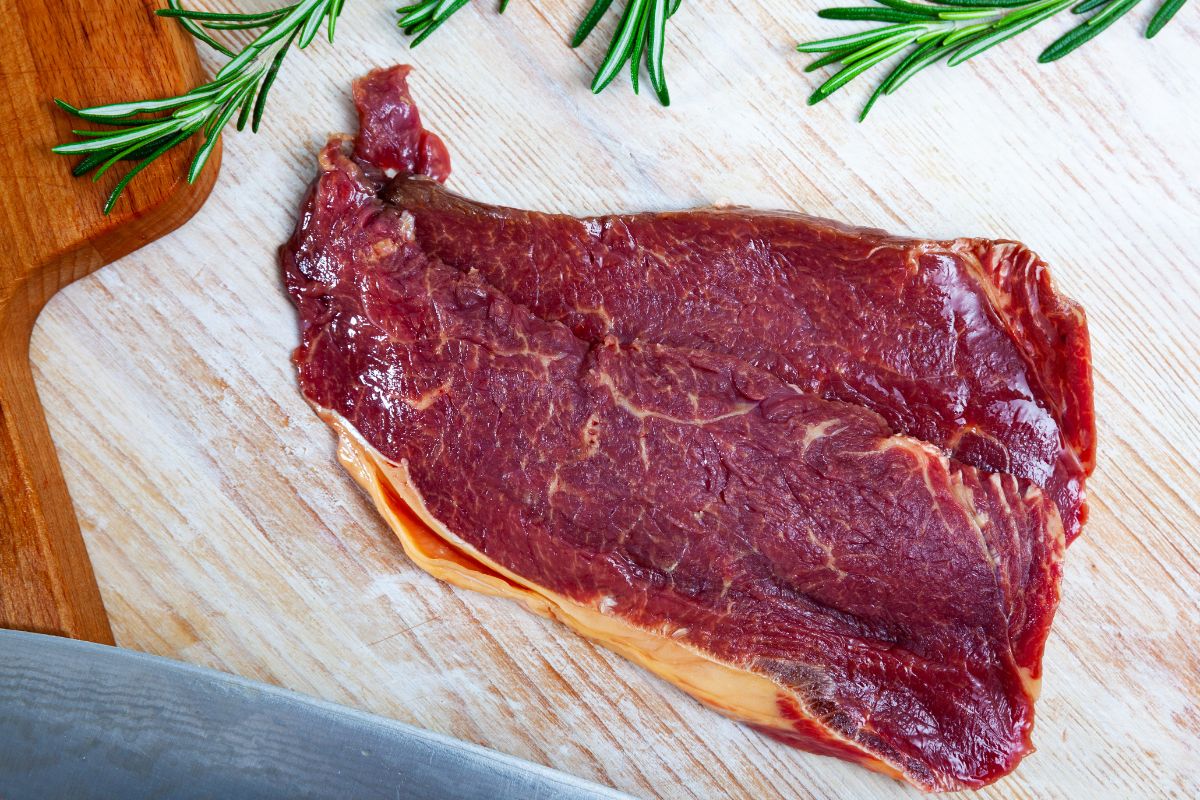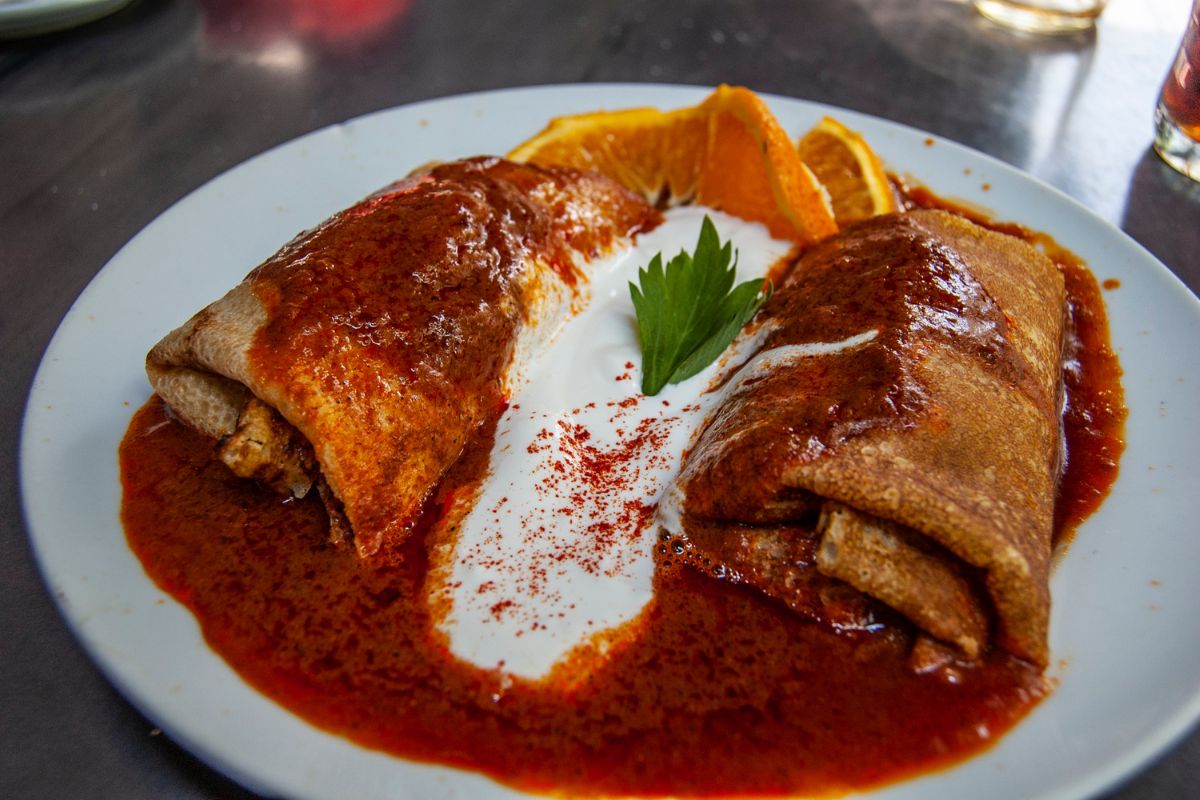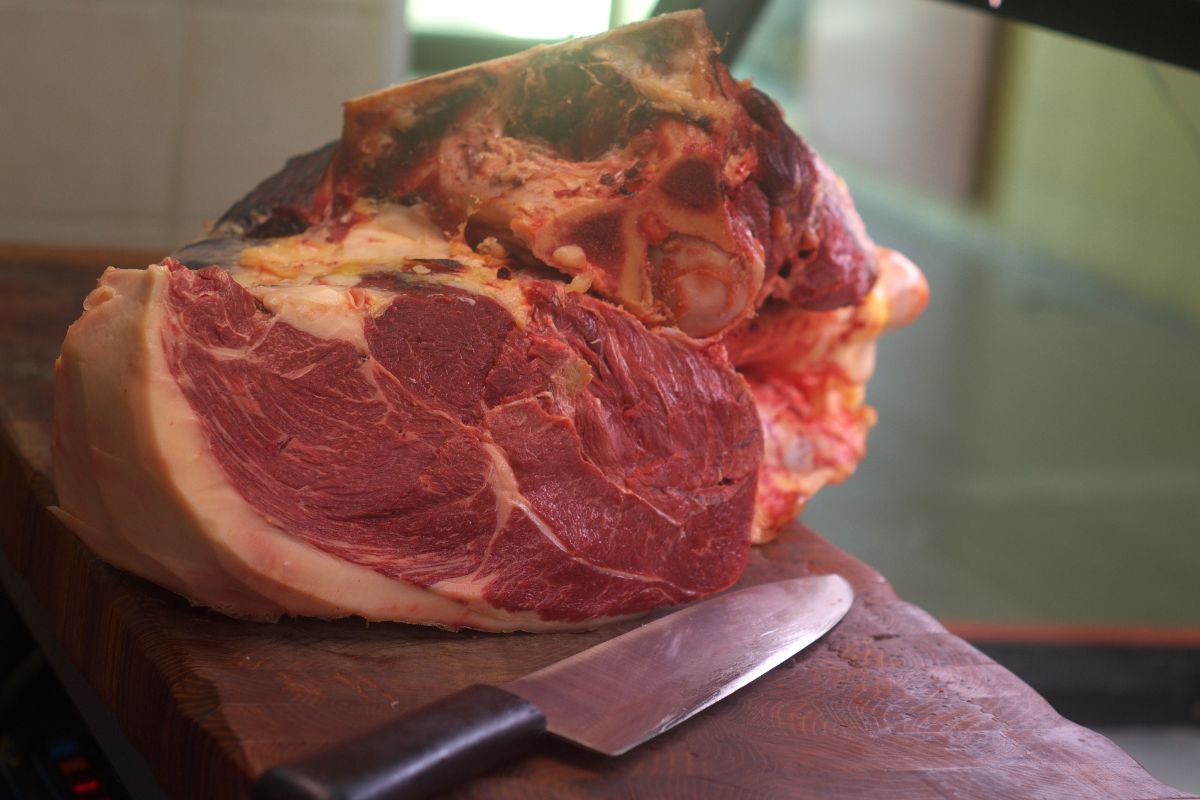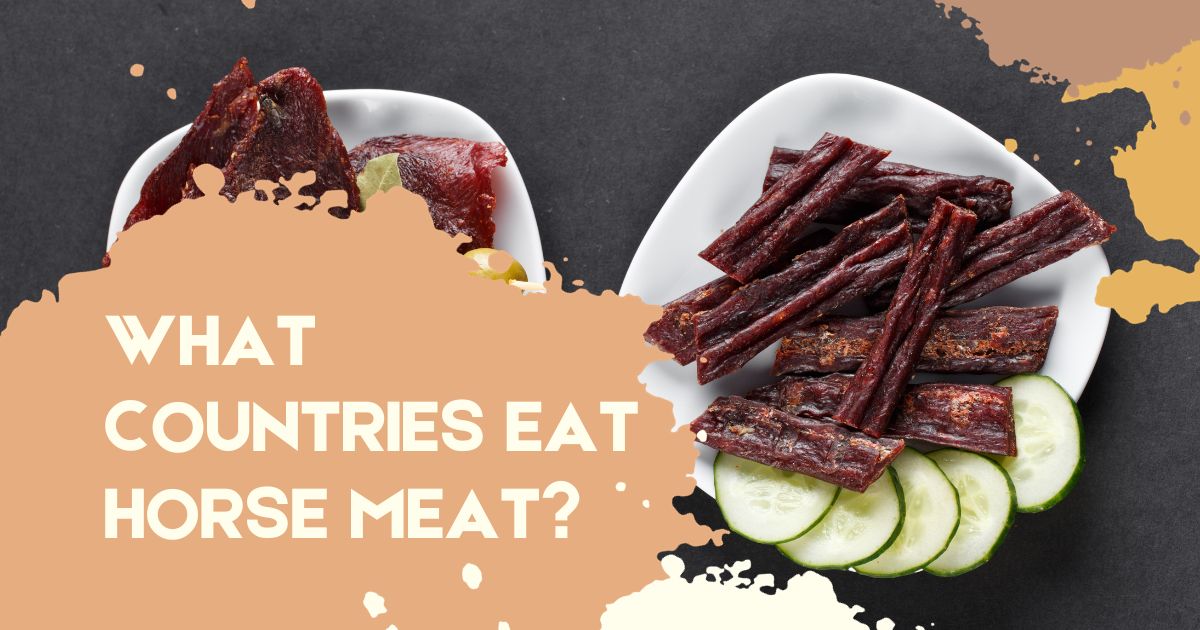What is Horse Meat Called?
In a world where culinary traditions vary significantly from one region to another, it’s intriguing to delve into what countries eat horse meat.
The consumption of horse meat is a practice that has sparked various debates, cultural discussions, and curiosity over the years.
This article will take you on a gastronomic journey to explore the countries where horse meat is not just a rare delicacy but a part of their culinary heritage.

Can You Eat Horse Meat?
Whether or not you can eat horse meat depends on several factors, including location, local laws and regulations, cultural norms, and personal preferences. In some cultures, horse meat has a long history as a food source and is a common delicacy. Whereas in other regions, there are ethical or cultural concerns associated with this practice.
Here are some key considerations:
- Legal and regulatory factors: In some countries and regions, the consumption of horse meat is legal and regulated, similar to other types of meat. In such places, you can purchase and consume horse meat from sources that comply with the relevant food safety and animal welfare regulations.
- Cultural and ethical factors: The acceptability of consuming horse meat varies depending on cultural and ethical considerations. In some cultures, eating horse meat is commonplace and culturally accepted. In contrast, other cultures consider this taboo or ethically objectionable due to the historical and symbolic significance of horses as companions and working animals.
- Personal preferences: Ultimately, whether you choose to eat horse meat is a matter of personal preference. Some individuals may have no ethical or cultural objections and want to try horse meat as part of their culinary exploration. Others may opt not to consume it for various reasons.
It’s important to research the legal regulations and cultural norms in your area if you are considering eating horse meat. Remember that attitudes and opinions regarding horse meat can be diverse, and it’s essential to respect the choices of others when it comes to food consumption.
Is Horse Meat Legal?
The legality of horse meat varies from one country to another.
In some countries, horse meat is legal and subject to regulation, similar to other types of meat. These regulations ensure the safety and quality of the meat. Additionally, they address concerns related to animal welfare and the use of veterinary drugs. For example, France, Italy, Japan, and Kazakhstan are among the countries with such regulations.
Whereas, in certain countries, horse meat consumption may be illegal, restricted, or discouraged due to cultural or ethical reasons. While not explicitly banned, it may be less common and not widely available. For example, many people in the United States do not eat horse meat. Also, there are strict legal restrictions on its production and sale in some states.
What Countries Still Eat Horse Meat?
Some of the countries where people still consume horse meat include:
France
Eating horse meat in France is a well-established culinary tradition and a part of the country’s gastronomic culture. Horse meat, known as “viande de cheval” in French, is not only considered a delicacy by many but also featured in a variety of dishes. One of the most famous is “Bifteck de Cheval,” a horse steak.
The consumption of horse meat in France has a long history, dating back to the 19th century. Initially, it gained popularity due to its affordability compared to other meats. Many French towns and cities have butcher shops dedicated to selling horse meat. These shops provide a variety of cuts, including steaks, sausages, and ground horse meat.
Italy
Eating horse meat in Italy is a cultural tradition practiced for centuries. It remains a distinctive part of the country’s culinary landscape. Horse meat, known as “carne di cavallo” in Italian, is popular in various regional dishes.
Italians have developed a range of culinary preparations for horse meat. One of the most renowned dishes is “Stufato di Cavallo” (horse meat stew). It has thinly sliced raw horse meat, typically seasoned with olive oil, lemon, and spices. It’s a delicacy known for its tender texture and delicate flavor.
The consumption of horse meat varies across different regions of Italy. In some areas, it is more prevalent and deeply rooted in local traditions, while in others, it may be less common. The production and sale of horse meat are subject to strict regulations in Italy, ensuring that consumers can have high confidence in the safety and quality of the meat they purchase.
Japan
The consumption of horse meat in Japan dates back centuries, with evidence suggesting it was a part of the ancient Japanese diet. Commonly known as “sakaba” or “sakuraniku,” horse meat is consumable in some regions, often served raw as sashimi or hot pot dishes.
Most Japanese serve it as “basashi,” thinly sliced raw horse meat similar to sashimi. It contains soy sauce, wasabi, and grated garlic. Basashi is well known for its tender texture and slightly sweet, gamey flavor.
The popularity of horse meat varies across different regions of Japan. Kumamoto is particularly renowned for its basashi, which is often enjoyed during celebrations and festivals. It also has specialty restaurants that focus on serving this unique dish.
Kazakhstan
Eating horse meat in Kazakhstan is a long-standing and culturally significant tradition deeply rooted in the country’s history. Horses have played a crucial role in Kazakh culture and daily life, and their meat has been a valuable source of sustenance for generations.
Horse meat is often useful in a variety of culinary preparations. One of the most famous dishes is “beshbarmak,” a traditional Kazakh dish with boiled horse meat served with pasta, onions, and spices.
Unlike other countries, the consumption of horse meat in Kazakhstan originates from the practical aspects of their nomadic life. There are generally no significant ethical concerns regarding this practice.
South Korea
Eating horse meat in South Korea is a practice with a relatively recent history compared to some other countries. It has gradually evolved to reflect modern culinary preferences.
One of the most well-known dishes is “yukhoe” (marinated horse meat), a Korean-style raw horse meat tartare, often seasoned with various ingredients like soy sauce, sesame oil, and garlic.
While horse meat consumption doesn’t have the same historical significance in South Korea as in some other countries, it has found a place in modern Korean cuisine. It is delicious and loved by those who appreciate its unique flavor and texture.
Mongolia
Mongolia has a long-standing relationship with horses. They play a central role in the daily lives of the Mongolian people. They are popular for transportation, herding, and as a source of food.
One of the most famous dishes is “khorkhog,” a traditional Mongolian stew with horse meat, vegetables, and stones heated over an open flame. The stones create a unique cooking method and infuse the meat with distinct flavors.
The consumption of horse meat In Mongolia is a way to honor these animals and use every part, minimizing waste. It is a valuable source of protein and essential nutrients. It also sustains the nomadic herders who often live in challenging and remote environments.
Switzerland
Eating horse meat in Switzerland is a practice that exists, but it is not as widespread or deeply rooted in the culinary traditions as in some other countries. Switzerland has a diverse population with varied food preferences. Certain Swiss regions have a tradition of consuming horse meat.
While horse meat is not prevalent in mainstream establishments, it is available in specific butcher shops or restaurants.
Belgium
The consumption of horse meat in Belgium has historical roots that date back to the 19th century when it was a more affordable source of meat. Commonly known as “paardenvlees” in Dutch, it is consumable in various forms. It is popular in a variety of Belgian dishes.
One of the most well-known is “horse carbonnade” (paardenstoofvlees in Dutch), a hearty stew made with horse meat, beer, and onions. It is common during local festivals and celebrations. It is also a delicacy in certain parts of Belgium.
The acceptance and popularity of horse meat vary across different regions of Belgium. Some areas, particularly Flanders and Wallonia, have a stronger tradition of consuming horse meat. The production and sale of horse meat are subject to strict regulations that guarantee quality and safety standards, safeguarding the consumers’ interests.
Canada
While Canada is well known for its diverse culinary traditions, the consumption of horse meat is relatively limited. It is not a mainstream part of the Canadian diet. It was popular in Quebec, and it is still available in some restaurants.
The sale and consumption of horse meat in Canada is legal. However, there are strict regulations in place to ensure that the meat comes from sources that meet health and safety standards. These regulations protect consumers and ensure the ethical treatment of animals.
Romania
The consumption of horse meat in Romania has historical roots dating back to the country’s rural and agricultural heritage. It has been a traditional source of sustenance for generations. It is both a practical source of nutrition and a cultural tradition.
One of the most well-known dishes is “mici” or “mici cu carne de cal,” which are small, grilled sausages made from a mixture of ground meats, including horse meat, pork, and beef. These sausages are a popular street food and a common feature at barbecues.
Poland
Poland has a diverse food culture that includes eating various types of meat, horse meat being one of them. The consumption of horse meat in Poland has historical roots, dating back to medieval times.
Horses were traditionally useful for various purposes, including meat production. One of the traditional dishes is “kiełbasa myśliwska,” a smoked sausage that may include horse meat as one of its ingredients.
Hungary
The consumption of horse meat in Hungary has a legacy that dates back to the country’s nomadic past. Horses played a central role in Hungarian history, and their meat was an essential source of nutrition.
Horse meat, known as “lóhús” in Hungarian, has been a part of their cuisine for centuries. One of the most well-known dishes is “hortobágyi palacsinta,” which is a savory pancake filled with a mixture of ground horse meat and spices, typically served with a paprika sauce.

The Dangers of Eating Horse Meat
Eating horse meat is generally safe if you adhere to proper food safety and hygiene measures. However, there are some potential concerns and dangers associated with consuming horse meat.
Here are some dangers of consuming horse meat:
Drug Residue
One of the primary concerns with eating horse meat is the presence of drug residues. Horses get treated with various medications, including antibiotics and anti-inflammatory drugs. These animal drugs are not suitable for human consumption.
Additionally, some of these drugs, such as phenylbutazone (“bute“), are not approved for use in food animals and can be harmful to humans.
Contamination
Like any other meat, horse meat can be contaminated by bacteria, parasites, and pathogens if not handled and cooked correctly. Thorough cooking is essential to kill any potentially harmful microorganisms.
Allergies and Sensitivities
Some people may have allergies or sensitivities to horse meat, just as they might with other meats. Allergic reactions can differ in severity and may come with symptoms such as hives, itching, and difficulty breathing.
Individuals with known allergies or sensitivities should exercise caution when consuming any type of meat, including horse meat.
Can You Buy Horse Meat in the USA?
The sale and consumption of horse meat in the United States is under strict regulations. Also, it is subject to various legal restrictions. While it is not explicitly illegal to purchase or consume horse meat in the USA, there are significant limitations and considerations:
Legal Restrictions
The slaughter of horses for human consumption is illegal in the United States. In 2007, the last horse processing facilities in the U.S. were closed, and federal funding for horse meat inspection was suspended. This effectively made it illegal to produce horse meat for human consumption in the country.
Importation
It is illegal and prohibited to import horse meat from other countries to the U.S. for human consumption. However, some licensed specialty food stores or restaurants offer imported horse meat to cater to specific consumer preferences.
State Regulations
It’s important to note that state laws and regulations may vary. In some states, there are additional restrictions on the sale and consumption of horse meat. This makes it more difficult to find or purchase horse meat.
Cultural and Ethical Factors
The consumption of horse meat is relatively uncommon in the United States. It is subject to varying levels of social and ethical opposition due to cultural and historical factors. This can impact the availability and acceptability of horse meat in different regions.
Suppose you are interested in purchasing horse meat in the United States; it is advisable to research the specific regulations and restrictions in your state. Also, inquire about specialty food stores or ethnic markets that offer them.
However, due to the limited availability and varying state regulations, it may not be as accessible as more common types of meat like beef, chicken, or pork.
What Does Horse Meat Taste Like?
The taste of horse meat can differ depending on the animal’s age, diet, and preparation method. Generally, people who eat horse meat describe it as having a slightly sweet, lean, and tender quality.
Here are some characteristics of the taste of horse meat:
- Lean: Horse meat is typically lean, meaning it has a low-fat content, unlike other meats. This leanness can make it a bit drier and less juicy than meats with higher fat content.
- Slightly sweet: Some people describe horse meat as having a subtle sweetness to its flavor. This sweetness comes from the glycogen stored in the muscles of the horse.
- Tender: Horse meat is tender, especially when properly prepared. The tenderness can make it enjoyable to eat in various dishes.
- Earthy: Some describe the flavor of horse meat as having an earthy or gamey quality, especially compared to more commonly consumed meats like beef or chicken. This characteristic can vary depending on the horse’s diet and preparation.
- Similar to beef: Horse meat is sometimes comparable to beef in taste and texture, but it usually has a milder flavor.
It’s worth noting that cultural and regional differences can also influence the taste of horse meat in cooking and seasoning. In some culinary traditions, people prepare horse meat with specific spices and flavorings that can significantly impact its taste. Whether one finds horse meat appealing is a matter of personal preference, and it can vary from person to person.
Why Do We Eat Cows, But Not Horses?
The consumption of certain animals, such as cows and horses, varies widely across cultures. It entirely depends on a combination of historical, cultural, and practical factors.
Here are some reasons why cows are commonly consumed in many cultures while horses are not:
Historical and Cultural Factors
The historical and cultural significance of certain animals plays a significant role in their consumption. In many cultures, cows have been raised for their milk, meat, and labor for centuries.
In societies such as Hinduism, cows are very sacred; they are highly revered and protected.
In contrast, horses are valuable for their role in transportation, agriculture, herding, and as companions, leading to a cultural aversion to eating them in many regions.
Utility
Traditionally, cows served various purposes, such as providing milk, leather, and draft power for agriculture. This practical aspect has made them a valuable resource and contributed to their consumption.
Horses, on the other hand, have historically been useful in numerous ways; thus, their consumption was generally considered wasteful and impractical.
Legal and Ethical Considerations
The consumption of horses is unethical in many cultures due to concerns about the treatment of these animals and their role as companions and working animals. In some countries, horses are also subject to specific legal protections that prohibit their slaughter for meat.
Taste and Tradition
Cultural preferences and culinary traditions also play a significant role. The taste of meat and the culinary traditions associated with it are influenced by what is acceptable and appealing within a given culture. In some cultures, horse meat is a delicacy, while in others, it is unpalatable.
The attitudes and practices regarding food consumption can change over time. In some places, the consumption of horse meat has increased or decreased based on shifting cultural norms and preferences.
Additionally, ethical considerations and animal welfare concerns have led to debates about the consumption of certain animals, including horses, in recent years. These debates may further influence the choice of which animals to consume.

Your Frequently Asked Questions Answered
Is Horse Meat Safe to Eat?
Yes, horse meat is safe to eat, provided it’s from trusted sources and is well-handled, processed, and cooked correctly. Just like with any other meat, ensuring safety and quality depends on various factors:
- Source: It’s crucial to obtain horse meat from reputable sources that adhere to food safety and animal welfare standards. Reliable suppliers and regulated facilities help ensure the meat is safe for consumption.
- Handling and processing: Proper handling and processing are essential to minimize the risk of contamination and ensure the safety of the meat. This includes appropriate storage, transportation, and hygiene practices during processing.
- Regulations: Many countries have strict regulations governing the production and sale of horse meat. These regulations help maintain safety standards and protect consumers.
- Cooking: As with all meats, thorough cooking is essential to kill potential pathogens. Cooking horse meat to the recommended internal temperature helps ensure it is safe to eat.
Why is Horse Meat Controversial?
There are several controversies surrounding horse meat consumption. The controversies vary from one region to another.
Here are some:
- Health and safety: Although you can consume horse meat when adequately sourced and prepared, there have been concerns about the safety of horse meat due to potential contamination or unsafe practices in some instances.
- Animal welfare: Concerns about the welfare and treatment of horses raised for meat are significant. Some individuals and organizations worry that horses may not be raised and slaughtered in humane conditions, which can raise ethical questions about their use as a food source.
- Laws and regulations: The laws and regulations surrounding the consumption of horse meat vary from one country to another. This can create confusion and debate, particularly in regions where the practice is not well-regulated.
- Mislabeling and fraud: In some instances, the controversy surrounding horse meat was exacerbated by cases of mislabeling or fraudulent food practices. There have been instances where horse meat was passed off as another type of meat in food products, leading to public outrage and concerns about food safety and transparency.
Are There Any Health Benefits to Eating Horse Meat?
Yes, there are some potential health benefits to eating horse meat, as with any lean meat source. Here are a few key benefits associated with consuming horse meat:
- Rich in protein: Horse meat is a good source of high-quality protein, essential for the growth and repair of tissues in the body. It provides the amino acids necessary for various bodily functions.
- Low in fat: Horse meat is relatively low in fat compared to some other types of meat, making it a lean protein source. It can be an attractive option for those looking to reduce their fat intake while still meeting their protein needs.
- Rich in nutrients: Horse meat contains essential nutrients such as iron, zinc, and vitamin B12, which are necessary for maintaining good health. Iron is particularly vital for carrying oxygen in the blood and preventing anemia.
- Omega-3 fatty acids: Horse meat may contain omega-3 fatty acids associated with various health benefits, including cardiovascular health. Omega-3s are well known to reduce inflammation and support brain function.
- Lower risk of diseases: The risk of diseases associated with red meat consumption, such as bovine spongiform encephalopathy (BSE or “mad cow disease”), is lower in horse meat.
How Can I Try Horse Meat Dishes if I’m Curious?
If you’re interested in trying horse meat dishes, you can explore restaurants in countries where it’s a part of the culinary tradition, such as France, Japan, or Italy. Ensure you’re respectful of local customs and practices when doing so.
Parting Thoughts
In conclusion, the consumption of horse meat is a topic that offers a fascinating glimpse into diverse culinary traditions worldwide. From France’s culinary excellence to Japan’s equine delicacies, Kazakhstan’s tradition, Italy’s unique dishes, and South Korea’s modern twist, horse meat is distinctive in each culture’s gastronomy.
However, this practice is not without its ethical and environmental concerns, which continue to be the subject of debate. Whether you’re intrigued by exotic flavors or concerned about ethical considerations, understanding what countries eat horse meat sheds light on the diversity of our global food culture.
It’s important to note that the safety and quality of horse meat, like any other meat, depend on proper sourcing, handling, and cooking. When eating horse meat, it’s crucial to ensure it comes from reputable sources that follow food safety guidelines during preparation to prevent health risks.

